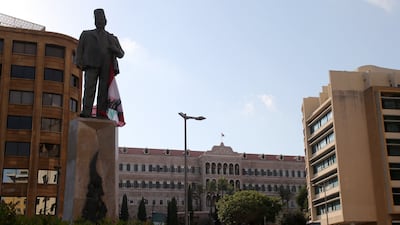Lebanon’s prime minister-designate Najib Mikati will meet with President Michel Aoun for a second consecutive day on Thursday, in a bid to break the deadlock in efforts to form a Cabinet.
The impasse has left the country without a functioning government for nine months while is it beset by political and economic crises.
Mr Mikati, a billionaire businessman, said on Wednesday that a draft Cabinet arrangement was being discussed with Mr Aoun and that talks would continue the next day.
“Matters are on the right track, and God willing, I will visit the president tomorrow afternoon,” Mr Mikati told reporters at the presidential palace, following their meeting.
A source close to the president said the same arrangement adopted in Hassan Diab's caretaker government is likely to be maintained when it comes to the allocation of key portfolios along party lines.
Mr Mikati is the third prime minister to be designated to form a Cabinet since Mr Diab resigned over a year ago, in the wake of the Beirut port blast that killed more than 200 people, injured thousands and devastated the capital.
His predecessor, Saad Hariri, the leader of the largest Sunni parliamentary bloc, failed to reach an agreement with Mr Aoun over the Cabinet’s make-up.
He accused Mr Aoun and his son-in-law Gebran Bassil of blocking the formation of a government where they lack veto power.
Mr Bassil, the head of the largest Christian party, has accused Mr Hariri of seeking to dictate the Cabinet line-up, in violation of the constitution, which requires both the approval of the president and prime minister.
Under Lebanon’s power-sharing system, the president is a Maronite Christian while the prime minister is a Sunni Muslim.
Mr Hariri has voiced his support for Mr Mikati’s bid, on condition he upholds the same principles.
Mr Hariri called for the formation of a Cabinet of non-partisan experts where no single political group enjoys veto power.
The Cabinet would enact reforms in exchange for international financial support, Mr Hariri said.
The international community has recently pledged $370 million in new humanitarian aid to help Lebanon’s most vulnerable communities weather the economic crisis.
The crisis, which unfolded in late 2019, has led to power blackouts, disruption in water supplies, internet outages and shortages in vital commodities ranging from petrol to medication.
The international community said financial support to help the government tackle the crisis is conditional on the formation of Cabinet that enacts reforms to kick-start the economy and fight corruption.


